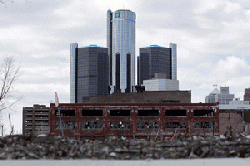Detroit filed the largest-ever municipal bankruptcy in U.S. history on Thursday, marking a new low for a city that was the cradle of the U.S. automotive industry and setting the stage for a costly court battle with creditors.
The bankruptcy, if approved by a federal judge, would force Detroit’s thousands of creditors into negotiations with the city’s Emergency Manager Kevyn Orr to resolve an estimated $18.5 billion in debt that has crippled Michigan’s largest city.
The future of retiree pension and health benefits for thousands of city workers hangs in the balance.
Anticipating the filing, investors drove prices of Detroit bonds and notes lower, sending their yields to record highs on Thursday.
In a letter accompanying the filing, Michigan Governor Rick Snyder said he had approved a request from Orr to file for Chapter 9 bankruptcy protection noting, “Detroit simply cannot raise enough revenue to meet its current obligations, and that is a situation that is only projected to get worse absent a bankruptcy filing.”
Speaking on Channel 4 Detroit after the announcement, Snyder, a Republican, said, “Let’s stop the decline. Let’s get to stability. Let’s get things working in the right direction.”
Snyder named Orr in March to tackle the city’s spiraling long-term debt, which is estimated at $18.5 billion.
A White House spokeswoman said Democratic U.S. President Barack Obama and his senior team were monitoring the situation in Detroit closely.
“While leaders on the ground in Michigan and the city’s creditors understand that they must find a solution to Detroit’s serious financial challenge, we remain committed to continuing our strong partnership with Detroit…,” White House spokeswoman Amy Brundage said.
Detroit was once synonymous with U.S. manufacturing prowess. Its automotive giants switched production to planes, tanks and munitions during World War Two, earning the city the nickname of the “Arsenal of Democracy.”
Now the city’s name has become synonymous with decline, decay and crime. Detroit has seen its population fall to 700,000 from a peak of 1.8 million people in 1950. The city’s government has been beset by corruption cases over the years. Waning investment in street lights and emergency services has left it struggling to police the streets.
The city’s murder rate is at its highest in nearly 40 years; only a third of its ambulances were in service in the first quarter of 2013; and its nearly 78,000 abandoned buildings create “additional public safety problems and reduces the quality of life in the city,” the governor noted in his letter.
In June, Orr presented a proposal to creditors offering them pennies on the dollar. His plan had met with resistance from some creditors, most notably Detroit’s two pension funds representing retired city workers. The funds recently filed lawsuits in a state court challenging the governor’s ability to authorize Orr to file for bankruptcy.
Long road ahead
Creditors are expected to mount a stiff challenge to the bankruptcy, which was filed in the U.S. Bankruptcy Court in the Eastern District of Michigan.
Douglas Bernstein, a bankruptcy attorney at Plunkett Cooney in the Detroit suburb of Bloomfield Hills, said he expected the case would last one-to-three years and would be very costly.
“This could run to tens-of-millions to hundreds-of-millions of dollars,” he said.
Unlike corporate bankruptcies, there have been relatively few Chapter 9 cases since the Bankruptcy Act was amended in 1934 to include municipalities. This means there is little precedent and the number of creditors means a complicated road ahead.
“It’s a very complex landscape and it’s one that’s going to be watched very closely by municipal investors,” said Robert Amodeo, a portfolio manager at Western Asset in New York.
General Motors, the only major U.S. automaker headquartered in Detroit, said in a statement that the company “is proud to call Detroit home and…(this is) a day that we and others hoped would not come. We believe, however, that today also can mark a clean start for the city.”
Ford Motor Co, which is based in the Detroit suburb of Dearborn, said it was “optimistic that governmental leaders will be successful in strengthening the community.”
But Ed McNeil, chief negotiator for a coalition of 33 unions that represent most of the service workers for the city of Detroit said the bankruptcy filing was about “busting the unions.”
“I’ve said all along that this is a power grab,” said McNeil. “This is not about fixing the city’s finances. It’s about the governor and his own agenda to take over the city of Detroit.”
–Reuters






Leave a Reply